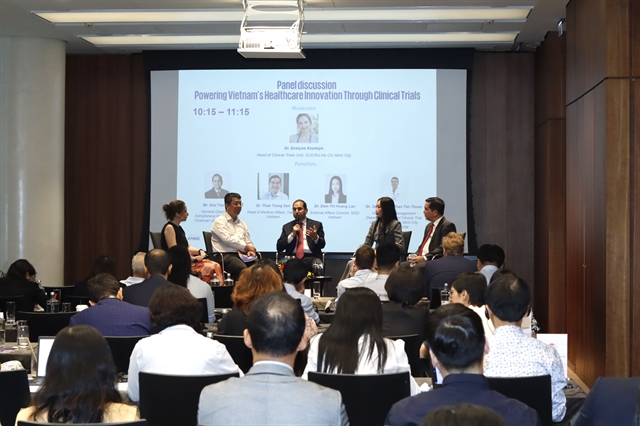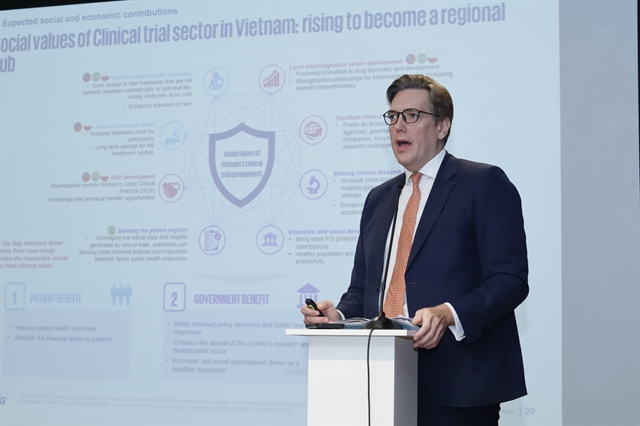Việt Nam’s clinical trials industry has the potential to become a regional hub if some big challenges are addressed through strategic reforms, experts said at the launch of the “Roadmap to the Future of Clinical Trials in Việt Nam” report by Pharma Group in HCM City on May 20.

HCM CITY — Việt Nam’s clinical trials industry has the potential to become a regional hub if some big challenges are addressed through strategic reforms, experts said at the launch of the “Roadmap to the Future of Clinical Trials in Việt Nam” report by Pharma Group in HCM City on May 20.
Launched in collaboration with KPMG and Oxford University Clinical Research Unit, the report offers a comprehensive analysis of the country’s clinical research landscape and suggests actionable strategies to position Việt Nam among ASEAN’s top three clinical trial and R&D destinations by 2030, identifying key opportunities, barriers and actions to unlock clinical research potential for both economic and health-related gains.
Over the past two decades, Việt Nam has made sustained investments in expanding healthcare access and strengthening its public health system, achieving universal health insurance coverage for 95 per cent of its population.
As it transitions to higher-quality care, innovation has emerged as a key priority, with clinical trials identified as a strategic pathway forward.
It has recently intensified efforts to enhance investment and implement policy reforms in this field.
Notably, last December, the Politburo issued Resolution No. 57-NQ/TW outlining a commitment to developing domestic innovation capabilities and allocating 2 per cent of GDP to R&D.
According to the report, with a population exceeding 100 million, Việt Nam offers vast potential for clinical research.
Its diverse population structure is particularly well-suited for studying complex diseases, including cancer, cardiovascular disorders, infectious diseases, and metabolic conditions.
These inherent advantages, moreover, are further strengthened by government initiatives to improve the business environment, which are increasingly attracting global pharmaceutical companies and contract research organizations.
Darrell Oh, chairman of Pharma Group, said: "Clinical trials represent Việt Nam’s next frontier for healthcare R&D advancement.
“From the innovative pharmaceutical industry’s perspective, Việt Nam possesses strong potential to emerge as a competitive regional destination for clinical research.
“Realising this ambition will require prioritised policies and initiatives that attract and facilitate clinical trial investments—particularly in early-stage trials. Such dedicated efforts and multi-stakeholder collaboration would unlock a multitude of economic, scientific, and health benefits, including: stimulating high-value research activity through infrastructure development and skilled job creation, strengthening Việt Nam’s healthcare innovation ecosystem while creating cross-sector economic spillovers, and generating broader healthcare system benefits.
“This aligns perfectly with national strategies and Việt Nam’s goal to become a top-three ASEAN destination for high-value investments. Pharma Group is committed to supporting the Government and healthcare stakeholders in charting the course forward—attracting clinical trials and advancing the country’s R&D capabilities," he said.
Unlocking clinical trial potential

In addition to opportunities, the report identifies five key challenges Việt Nam must overcome: a lengthy and multi-step approval process that can take up to 12 months, limited research infrastructure with only 40 Good Clinical Practice-certified sites nationwide, a shortage of specialised human resources, a lack of structured funding mechanisms, and the absence of strong incentive policies to attract investment.
Speaking at the event, Dr Specialist II Phan Tấn Thuận, head of the line management department and the clinical trial unit at the HCM City Oncology Hospital, said cancer is a major health burden in Việt Nam and globally. Over the past 20 years, the field of cancer diagnosis and treatment has made remarkable progress with the advent of immunotherapies and next-generation treatments.
The number of clinical trials at his hospital has increased significantly, greatly expanding patient access to advanced therapies.
“However, we still face many challenges in terms of infrastructure and specialised human resources. We are working hard to standardise procedures, enhance our capabilities, and build a research network to meet the growing demands.”
The report provides strategic recommendations to position Việt Nam as a leading regional clinical trial destination, categorised into policy and non-policy measures, with short-, medium- and long-term implementation timeframes.
Policy recommendations focus on regulatory reforms, streamlined approval mechanisms, and investment incentives.
The non-policy recommendations address infrastructure improvements, workforce and R&D capability development, dedicated clinical trial support, and public-private partnerships.
Each recommendation identifies key stakeholders responsible for implementation and is supported by successful examples from other countries, providing a clear pathway to unlock the full potential of the country's clinical trial sector.
To streamline review and clinical trial approval processes, Việt Nam should adopt bilingual documentation for both regulatory and reporting materials to enhance access for international sponsors, implement a centralised online submission and electronic approval system to reduce timelines, eliminate redundancies, and introduce a fast-track pathway for trials already approved by overseas regulatory authorities.
To support advanced research, Việt Nam also needs to expand its network of GCP-certified facilities and establish standardised Clinical Trial Units.
The report recommends the establishment of a national centre of excellence to serve as a platform connecting hospitals, research institutes, universities, and industry, a training hub for clinical researchers, an accelerator for trial approvals and global partnerships, ultimately positioning Việt Nam as a competitive clinical research destination.
Luke Treloar, partner, head of infrastructure, government and healthcare, KPMG in Việt Nam, said, if these reforms are implemented effectively, Việt Nam would generate thousands of high-quality jobs, elevate its global standing in medical research and offer early access to cutting-edge treatments.
“We strongly believe that with the right policy framework and continued multi-stakeholder collaboration, Việt Nam is poised to become a leading hub for clinical trials in Southeast Asia, driving sustainable growth and advancing healthcare innovation in the region.” — VNS





